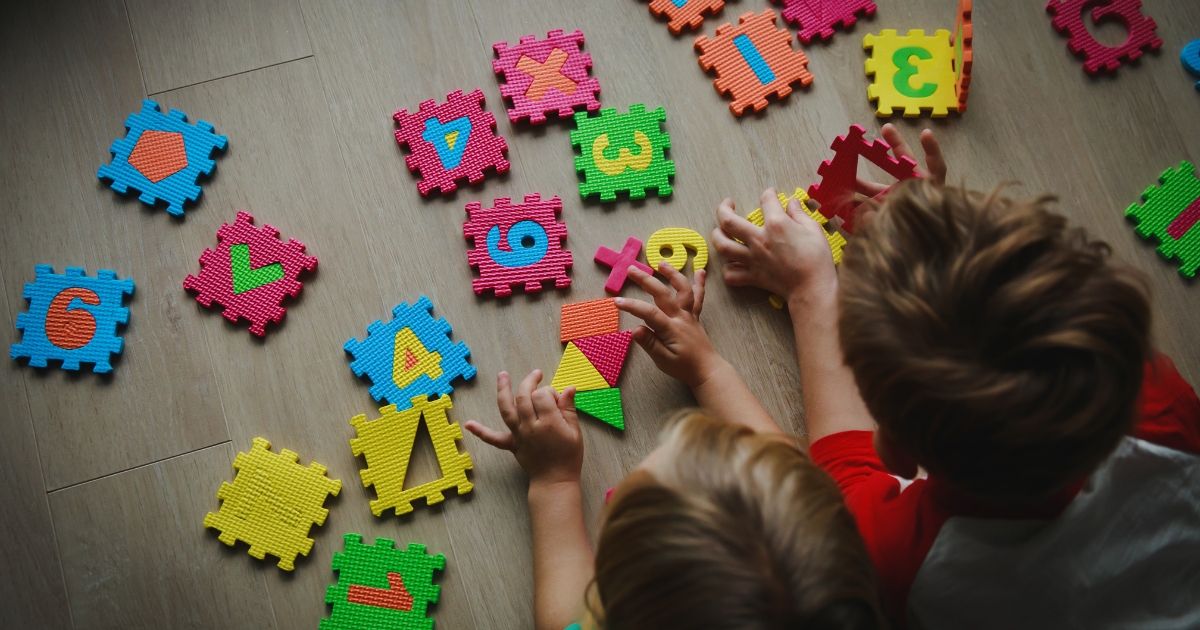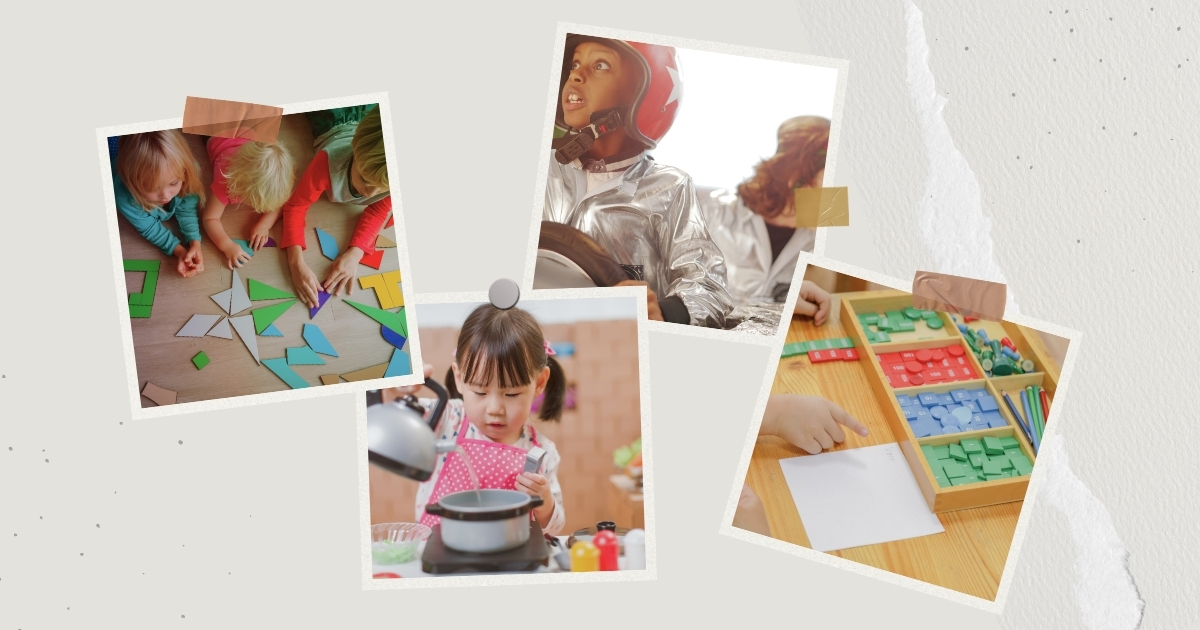Math is often regarded as a challenging subject by both kids and parents. However, it doesn’t have to be that way. By incorporating play-based math activities into your homeschool curriculum, you can transform math into an enjoyable, hands-on learning experience. This approach not only encourages a love for numbers but also strengthens understanding and retention of mathematical concepts.
Why Play Matters In Mathematical Learning
Children naturally engage with the world through play. It’s how they explore, experiment, and make sense of new ideas. When math is taught through structured lessons alone, it can sometimes feel abstract or disconnected from daily life. Play, however, bridges the gap. It turns math into an interactive, visual, and practical experience, making even complex ideas easier to grasp.
Research supports the benefits of play in education. Studies show that activities involving problem-solving, creativity, and collaboration help children build critical thinking skills while fostering a growth mindset. Play-based math activities tap into curiosity and offer children a safe space to make mistakes, discover patterns, and develop confidence in their math abilities.
Benefits of Play-Based Math Activities
- Natural Engagement
Kids are naturally drawn to play. By embedding math within games or hands-on activities, engagement levels soar. They’re not just solving problems; they’re having fun. - Practical Application
Games often situate numbers within real-world contexts. Whether it’s measuring for a craft project or keeping score in a game, kids see how math is used in everyday scenarios. - Encourages Critical Thinking
Many math games are rooted in problem-solving and logic. These activities challenge children to think strategically and come up with creative solutions to win or progress. - Reduces Anxiety
Math anxiety is real, and it often starts at a young age. Introducing math play creates a relaxed environment where children can explore without fear of failure.
Easy-To-Implement Play-Based Math Activities
You don’t need fancy tools or expensive resources to incorporate play-based math into your homeschooling routine. Here are some simple, creative ideas:

- Building Blocks and Geometry
- Use building blocks, such as LEGO, to explore geometry and symmetry.
- Ask your child to create a structure using a specific number of blocks. Count the blocks used, discuss shapes, or calculate area and perimeter.
- Challenge them with tasks like making patterns or recreating 3D objects based on visual instructions.
- Number Bingo
- Create bingo cards using numbers instead of letters. You can customize this activity to match your child’s skill level.
- For younger kids, focus on number recognition. Simply call out the numbers, and they mark them off.
- For more advanced learners, use simple math problems, such as “What’s 5 + 8?” The child finds the answer and marks it on their card.
- Baking to Learn Fractions
- Baking is full of math opportunities! Ask your child to measure ingredients, talk about fractions (e.g., “We need 1/2 a cup of sugar.”), and double or halve recipes to strengthen their understanding of proportions.
- After the baking is complete, discuss division as they cut and share the treats. It’s delicious math at work!
- Outdoor Math Treasure Hunt
- Write math problems on small sheets of paper and hide them around your yard or living room.
- Each solved problem unlocks a clue to the next location. Include basic arithmetic, counting challenges, or even geometry questions to make it a full adventure.
Fun Math Games for Kids
Games are a fantastic way to teach math skills while keeping kids entertained. They add structure to playful learning but maintain a lighthearted tone that keeps young learners engaged.
Board Games with a Math Twist
Some classic board games incorporate math skills naturally:
- Monopoly: Great for practicing addition, subtraction, budgeting, and multiplication.
- Yahtzee: Encourages pattern recognition and strategic addition.
- Sum Swamp: A fantastic and fun board game targeted toward early learners to practice addition and subtraction.
Online Math Games
If you’re open to screen time, educational math games are another option:
- Khan Academy Kids: Offers interactive math games tailored to different grade levels.
- Prodigy: A role-playing game where kids solve math problems to progress.
- CoolMath Games: Packed with logic puzzles, strategy games, and classic math challenges.
Deck of Cards Fun
- War with a Twist: Split a deck of cards between two players. Each person flips over the top card, and instead of simply comparing the two numbers, the first person to add or multiply them correctly wins the round.
- Memory Match: Write down math problems on one set of cards and answers on another. Mix them up, lay them face down, and have your child find matching pairs.
Play Beyond Formal Activities
Independent play also strengthens math skills. Toys like puzzles, construction sets, and even action figures can become math tools with a slight nudge. Encourage children to count pieces, measure distances, or explore patterns during their free play. Open-ended opportunities allow them to initiate their own math adventures without feeling pressured.
For instance:
- When building with blocks, try discussing symmetry or balance.
- Ask your child to count the wheels on toy cars and make groups based on different colors or sizes.
- Include everyday conversations about time, such as estimating how long it will take to tidy up toys.
Overcoming Resistance to Math Through Play
Not every child will instantly warm to math, and that’s okay. For children who feel hesitant about numbers, easing into the subject via games can help shift their perspective.
Start slow. Introduce activities that align with their interests. If they love drawing, try a math-related art project like creating mosaics or measuring lines. If they’re a fan of sports, consider using scorekeeping as an opportunity to discuss simple statistics or addition. The goal is to show kids that math doesn’t exist in isolation. It’s all around them, and it can even blend with their favorite hobbies.
Games become a medium for dialogue, patience, and encouragement. Celebrate small wins during these play sessions, such as successfully solving a single problem or mastering a new fraction. Positive reinforcement during games teaches kids that math isn’t about right or wrong. Instead, it’s about growth and exploration.
Structuring Play-Based Math Into Your Homeschooling Routine
When integrating play-based learning into your schedule, it helps to strike a balance between guided activities and child-led play. Consider the following tips:
- Start with a Goal
Decide which skills you’d like to prioritize. Whether it’s understanding multiplication or building number sense, having a focus will guide your choice of games and activities. - Dedicate Time Daily
Aim for a short, focused play session each day. Even 15–20 minutes of math play can reinforce skills and keep concepts fresh. - Encourage Variety
Rotate between game types. For instance, one day might focus on board games, while another swaps in outdoor scavenger hunts or baking activities. This variety helps kids stay engaged. - Be Flexible
Follow your child’s curiosity. If they’re especially invested in one type of game, spend extra time on it. Allow room for their preferences while still introducing new ideas regularly.
Play Builds Confidence and Positive Attitudes Toward Math
When kids learn math through play, their relationship with the subject transforms. Instead of seeing numbers as intimidating, they start to view math as a tool for solving puzzles, making things, and uncovering patterns in everyday life. Building confidence is central to success—not only in math but across all areas of learning.
Play gives children the freedom to experiment and problem-solve without fear of “failing.” Each game becomes another opportunity to grow and discover. For homeschooling parents, embedding play into math lessons offers a win-win situation. Kids gain essential skills, all while having fun and developing a can-do attitude that will serve them well into the future.
Make math part of your family’s everyday life through play, and you might be surprised to find yourself having just as much fun as your kids! By fostering a relaxed and creative environment, you’ll not only nurture a love of learning but also give your child the foundation they need to tackle math challenges with confidence and enthusiasm.





